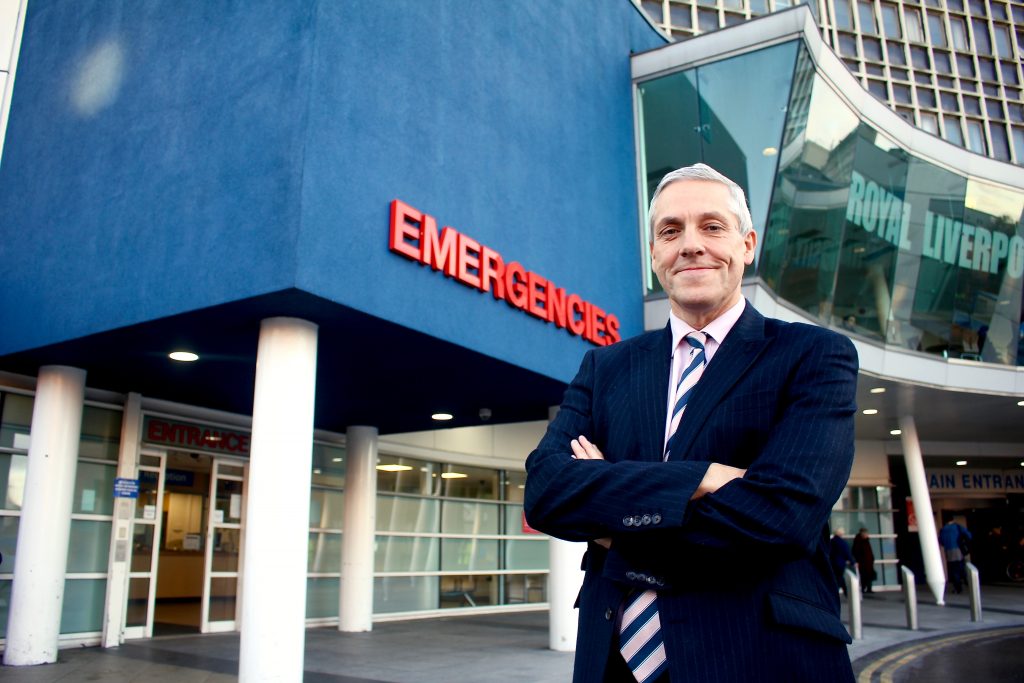Paul Moonan, Managing Director at Restore Scan and Aidan Kehoe, Chief Executive, Royal Liverpool and Broadgreen University Hospitals NHS Trust, reveal in this jointly authored article, how a partnership between Restore Scan and the Royal Liverpool is supporting the key aims of the NHS’s IT strategy.
The NHS has provided expert care by dedicated staff since its inception in 1948. But times have changed since the days of nurses with clipboards and matrons ruling wards with a rod of iron. Today the NHS has to be a finely tuned data machine in order to keep up with the demand for its services and to respond in the most effective way to a vast array of diverse clinical needs.
Medical personnel, with their unquestionable expertise, are still at the core of the NHS, but it could be argued that the new linchpin of the whole organisation is data. Decisions about patient care, efficiency at the point of service and throughput of patients are all intrinsically linked to the way in which data is managed, stored and retrieved. This is why the Government launched its NHS IT strategy encouraging total digitisation of healthcare facilities in order to create a paperless and joined up NHS by 2020.
The triple aim of the overall strategy is to achieve: better health for the British population, better care for patients and lower costs i.e. do more with the funding available. In creating this IT strategy, the Government is seeking to achieve some key deliverables. Namely: to empower the person, to support clinicians, to integrate services across health and care systems, to manage the health system and to create the future by using machine learning to push forward the boundaries of medical science.
Some leading NHS Trust hospitals are well on their way to meeting the Government’s 2020 paperless aims, and one shining example of this is the Royal Liverpool & Broadgreen University Hospital. With a population of around 1.2 million people, and one of the most complex health systems outside London, the North Mersey region is now firmly on the digital map thanks to its recent programme of patient record digitisation.
Leading-edge Digitisation
The Royal Liverpool, nominated as one of the country’s 12 global exemplar trusts, has proven itself to be a real front runner in the way it has harnessed digital technology to transform the speed at which its care can be delivered. Having just won the 2017 EHI Award for Best Global Digital Exemplar and with plans to move into new premises designed around a totally paperless environment by the end of June 2018, the hospital owes much of its leading-edge digitisation success to strategic partnerships that it has formed with third party suppliers.
One of its greatest challenges and priorities was to digitise its medical paper records so that they were in an electronic format ready for import into the Trust’s Electronic Document Management System (EDMS). With a need to manage over 1,000 requests for medical records per day, the hospital decided to award the digitisation contract to document management experts Restore Scan.
Restore Scan was chosen to provide a secure document scanning solution able to digitise and index over 100 million pages of active medical records for import into the hospital’s EDMS. As Restore Scan had many years of experience in working with healthcare organisations, the professional support that it was able to bring to the project made it an easy choice.
Sensitive Data
Medical records, by their very nature, contain large amounts of data classified as sensitive data. Given that security breaches are a constant threat to hospital systems and patients, it was crucial that Restore Scan had already met the standards of IG Toolkit compliance and ISO27001. The secure medical scanning, archiving, indexing and retrieval processes offered by Restore Scan assured the hospital that its documents would be secure at all times.
By using a third-party supplier like Restore Scan, the hospital achieved a service which provided full management of its patient record end-to-end process; from file preparation and scanning to confidential and secure destruction of records. The project went live in mid-October 2016 and by the end of 2016 had already delivered over 10 million images scanned. The Chief Executive of the Royal Liverpool University Hospital, Aidan Kehoe, commented: “There is a strong sense of collaboration between Restore and the staff at the Royal. The output and productivity are impressive. It will make a fundamental difference to how we deliver patient care.”
Better healthcare for the people in the North Mersey region has always been at the centre of the digitisation aims. Some discernible benefits already include: a decrease in the time required to administer patient records, reduced incidence of lost or misfiled records, instant access to records for clinicians, reduction of storage space needed for record holding and increased record security – due to records being more resilient and secure and being stored in an access-controlled and audited environment.
Speed and Accuracy
A key area which has seen big improvements since the start of the digitisation programme is the speed and accuracy of information retrieval. With digitised records comes a standard presentation making navigation around them easier. In addition to this, the fact that the physical file no longer has to be delivered by hand to the right location at the right time means that clinicians are able to access critical patient information quickly and securely.
Restore Scan’s input, which has saved the hospital from employing its own staff and buying the state-of-the art scanners required to meet its needs, means that clinicians are now able to access live files and make updates as they go along in an efficient and hygienic way. The files cannot be physically damaged nor will they pass through many hands before they end up in front of the healthcare provider and decision-maker. The knock-on effects send a ripple through the system. Not only are clinicians able to capitalise on the efficiency benefits to their own workload but they are able to spend more patient facing time while having a greater throughput of patients.
The hospital found that having a trusted third-party involved in the digitisation process also reduced the running costs associated with traditional document management processes. As well as streamlining the record management system, it has reduced the chances of duplications, has lowered storage costs and cut out the need to employ someone to move the records around physically.
High Security
Restore Scan’s high security premises, which are also used to archive the physical records after scanning, has the advantage of quick and easy same-day retrieval of original documentation should the hospital need it.
As well as helping the Royal Liverpool to meet the key aims of the Government’s IT strategy, the work undertaken by Restore Scan has boosted the organisation’s ability to have its data ready for compliance with the General Data Protection Regulations (GDPR) coming into effect from 25th May next year. The record management service provided by Restore Scan is already GDPR compliant and comes with enhanced security assured by having IG Toolkit compliance.1
In conclusion, NHS England should be reassured that one of its leading global exemplar trusts is so far along its path to patient record digitisation and set to meet the triple aims of its IT strategy. Due to the Royal Liverpool’s astute partnerships not only are the people of North Merseyside going to experience fast, efficient healthcare delivered in state-of-the-art premises but crucially will have total peace of mind that their personal data is in the safest of hands.
For more information please visit: https://www.restore.co.uk/









Recent Comments